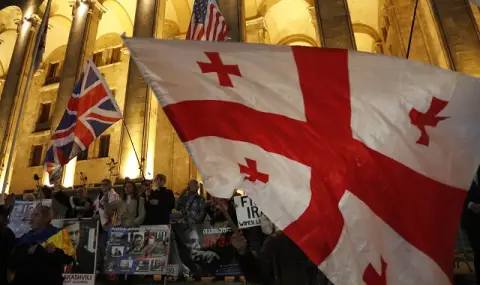The end of anti-government demonstrations in Georgia is not it is visible. Protesters say they are fighting not only for their European future, but also against Russian influence. DV report from Tbilisi:
Day after day, protesters with Georgian and EU flags gather on the streets of Tbilisi and throughout the country. Cold temperatures and brutal police repression do not stop the demonstrations.
The protesters have two main demands: holding new elections after the disputed parliamentary ones in October and returning to the European path of development laid down in the country's Constitution. The ruling party "Georgian Dream" accuses the opposition of organizing a new Maidan with the help of "foreign patrons".
Rejecting Europe and returning to the Russian orbit?
Georgian society was outraged by the actions of the government, and in particular by its decision to suspend until 2028 the negotiations for the country's accession to the EU and to refuse funding from Brussels. Most demonstrators believe that Russia is pulling the strings behind the scenes.
"We have been striving to become part of the EU since the time of our independence. They will not admit that they are Russian puppets, as is the case in Belarus. But we see that they are stopping our European future," a university professor, a participant in the protests in front of the parliament, told DV.
The ruling party firmly denies its pro-Russian sympathies, presenting itself as the only political force that can save Georgians from another war amid Russia's full-scale invasion of Ukraine.
"Today there is a global confrontation and you are either on one or the other side of the barricades - there is no middle position. Russian influence in Georgia is increasing. If the government confronts Europe, it means that it is on Russia's side," added the representative of the academic community.
In his election campaign "Georgian dream" appeared as a supporter of the country's pro-European path of development, which most Georgians openly support, as polls show. But after securing power, the party made a sudden foreign policy turn that shocked many.
If the government wants Russia for us, why does it want Europe and the USA for its children who study and live there? Obviously, it's easier for them to be corrupt and earn money with Russia, but to spend it in Europe," actress Iva told DV. All her theater colleagues are now on strike. .
Violations and falsifications of elections
In October, the Central Election Commission of Georgia published the results of the parliamentary elections and announced that the "Georgian Dream" she won them with 54 percent of the votes. Pro-European President Salome Zurabishvili, opposition parties and civil society groups accused the government of rigging the election.
The ruling party claims the election was fair, but local and international observers documented numerous violations.
Zviad is among those who question the legitimacy of the elections. That is why he insists on their re-holding and participates in the protests. "I saw how the observers of the ruling party put pressure on people at the polling stations to vote for 'Georgian Dream.' I documented it. The ruling party has captured all state institutions - the parliament, the courts and the election commission."
A few hours after the start of another peaceful protest, the streets of Tbilisi descend into chaos. The police chased the protesters, detained them and beat them. Ombudsman Levan Yosseliani accused the police of brutality and torture.
Translator Data Karaishvili, who also participated in the demonstrations in support of the EU, told DV that he was severely beaten by the police. "Cops don't have red lines. They are using violence to stop people from participating in the rallies," he said.
To the bottom of the ocean
According to the latest data of "Transparency International" around 400 people were detained and more than 300 were injured, including journalists.
Prime Minister Irakli Kobakhidze blamed opposition leaders for the violence and injuries and praised the police for their actions. He emphasized that law enforcement officers were attacked by protesters with stones and fireworks.
Despite his injuries - a broken nose and a concussion - Data Karaishvili is adamant that he will return to the streets once he recovers. "I fight for democracy and human rights in my country. We are descending to the bottom of the ocean. We will be like Belarus. There's no turning back, they can't stop us," he says.
Many of the demonstrators in Tbilisi's parliament square believe that the current constitutional crisis is a "now or never" moment. While the government shows no signs of backing down, both sides seem to be waiting to see who will tire first.
"How long will this go on? We can stay here for two or three weeks, but what are we going to do next? I'm afraid that our protest will eventually die down," said Anna, one of the protesters.
"We want a peaceful compromise," say most of the demonstrators. But others paint a rather bleak picture and mention the word "revolution".
Is Georgia really heading for a revolution?
